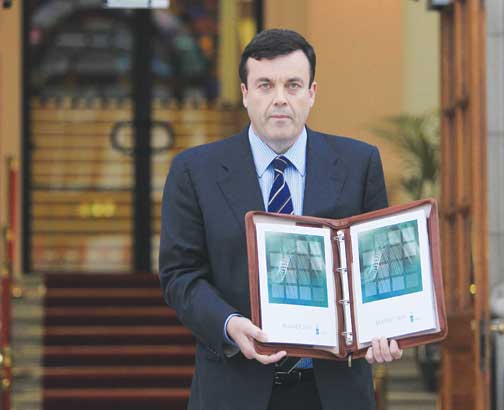


SERVICES
Tuesday December 14, 2010
Harsh Budget Clears First Hurdles
Brian Lenihan at Government Buildings before he presented the Budget for 2011 to the Dail (Photocall) Laws to give effect to some of the most controversial measures in last week's 2011 Budget have already been passed by the Dail. These include a cut in the minimum wage to €7.65 per hour, and an €8 cut in social welfare payments including to recipients of disability, widows and carers allowances. Reductions in the salaries of the Taoiseach and government ministers, as well as in public service pensions have also been voted through. The Social Welfare Bill and Financial Emergency Measures Bill were carried easily by the government. A vote on the Finance Bill, which gives effect to all the other changes, is scheduled to take place early in the New Year. After that, Taoiseach Brian Cowen has already indicated that a general election will be called. The budget, although austere and controversial, contained no real surprises - most of the measures had already been outlined in the government's four year recovery plan. The biggest outcry followed a decision to cut social welfare payments to blind people and to carers by €8 per week. The Old Age Pension was left untouched - mainly due to lobbying from backbench and independent TDs. But lobby groups and opposition politicians asked why blind people, widows or carers were not equally protected from the cuts. Fine Gael finance spokesman Michael Noonan said it was the budget "of a puppet government" doing what it was told by the EU and IMF, and he accused the government of being "socially blind". "Why would you distinguish between old age pensions and widows pensions? What kind of social compass would suggest that widows can afford the cut and old age pensioners cannot?" he asked during his Dail speech. Mr Noonan drew laughs in the Dail chamber during a powerful immediate response to Finance Minister Brian Lenihan's speech. Speaking of the cuts to child benefit of €10 for the first and second child and €20 for the third child, he asked: "Minister, what have you got against third children?" "The fourth child won't be cut, the fifth child won't be cut, the 16th child won't be cut... Did some third child beat you up coming home from school as a young fella?" It was a moment of levity during an otherwise grim budget debate. The speech by Finance Minister Brian Lenihan contained a number of measures aimed at reassuring the public that those who could afford it would pay the most. He put a cap on public service salaries of €250,000, cut the Taoiseach's salary by €14,000 and Ministers' salaries by €10,000. But the size of cuts to the salaries of leading politicians was not considered enough by the public. Fine Gael leader Enda Kenny pointed out that after Mr Cowen's new salary of €214,000 was the result of a 5% reduction, while the cut in the minimum wage from €8.65 to €7.65 per hour represented a cut of 12% He said the Taoiseach's salary had gone from 13 times that of a person on the minimum wage before the budget to 14 times after it, suggesting that was not sensible, rational or equitable. But Taoiseach Brian Cowen defended his salary, pointing out that he had taken other pay cuts over the last two years, and his take home pay was now 45% less than it was when he took office in May 2008. Protests were held outside the Dail against the cut in the minimum wage, which Finance Minister Brian Lenihan said he hoped would encourage employers to take on more staff. But the Irish Congress of Trade Unions said there was no fiscal, economic or employment reason for the cut. "All the stuff about this being in the national interest is a load of old guff," said general secretary David Begg, "In our view, there must be some threshold of decency below which we do not go." One measure that was welcomed by homeowners was the introduction of a flat 1% rate of stamp duty on all property transactions up to €1 million. It's hoped the measure could restart the stagnant property market, by significantly reducing the tax burden on anyone buying or selling a house. However, it does mean a new cost for first-time buyers who had been made exempt from stamp duty. |
CURRENT ISSUE

RECENT ISSUES


SYNDICATE
[What is this?]
POWERED BY

HOSTED BY

Terms of Service | Privacy Policy
Website Design By C3I






